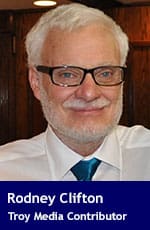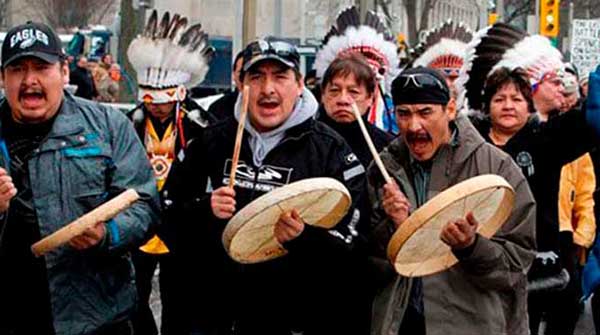UBCIC Chiefs attempt to suppress open debate on residential schools
 Is anyone surprised that the Union of BC Indian Chiefs on Aug. 12 wrote to many provincial municipalities (Powell River, Kamloops, and Quesnel, for example) demanding they reject “Residential School Denialism”?
Is anyone surprised that the Union of BC Indian Chiefs on Aug. 12 wrote to many provincial municipalities (Powell River, Kamloops, and Quesnel, for example) demanding they reject “Residential School Denialism”?
Their demand is in response to a book edited by C.P. Champion and Tom Flanagan, Grave Error: How the Media Misled Us (and the Truth about Residential Schools). The authors of the 18 chapters include several well-known Canadian anthropologists, historians, political scientists, sociologists, and lawyers, many of whom have published extensively on Indigenous/non-Indigenous issues.
Even so, the organization of Chiefs call this book an “ardent dissemination of racist misinformation.”
Their letter to municipal leaders concludes with the following:
“The UBIC Chiefs Council stand with survivors and intergenerational survivors of Residential Schools and their families, as well as the children who never made it home and those who are harmed by the actions of those involved with the production and distribution of the book … and the deeply troubling trend of Residential School racist denialism and any unwillingness to accept facts and the work of experts.”
 |
| Related Stories |
| Why the term genocide does not apply to Canada’s Indigenous tragedy
|
| The truth about genocide in Canada
|
| BC NDP brands non-Indigenous residents as “settlers”
|
“We look forward to your response.”
As an author of a chapter in Grave Error, as co-author of two other chapters, and as a co-editor with Mark DeWolf of From Truth Comes Reconciliation: An Assessment of the Truth and Reconciliation Commission Report, I am pleased to respond to the Chiefs.
My recommendation to municipal leaders, and other concerned Canadians, is that before you respond to the Chiefs, you should read Grave Error and make up your up your own minds.
On Amazon, Grave Error has over 800 reviews, with an average rating of 4.6 out of 5. In fact, this book is ranked first on three Amazon lists, and it has been a best seller for many months.
One of the top Amazon reviews begins, “A well-researched, non-partisan and balanced approach to the hysterical outpourings of recent years.” Another review says, “There is not one whiff of racism or hatred in this book.”
As a contributing author to Grave Error, I will add a little of my history.
I lived for four months during the Summer of 1966 in the teachers’ wing of Old Sun, the Anglican Residential School on the Siksika (Blackfoot) First Nation in Southern Alberta. At the time, students were still in residence, and I was a 21-year-old university student intern working at the Band Office, where about half the employees were Siksika members. Also, most of the employed in Old Sun, where I lived, were Siksika.
In the fall of 1966, I became the Senior Boys’ Supervisor in Stringer Hall, the Anglican residence in Inuvik, NWT, where I looked after 85 mostly Indigenous boys in three dorms. About half of the employees in this residence were Indigenous.
I returned to the University of Alberta for the 1967-68 academic year, and in the summer of 1968, I was employed as the Beach Supervisor and Swimming Instructor in Uranium City, Northern Saskatchewan, where I taught swimming to many Indigenous children in a local lake.
Finally, in September 1968, Elaine Ayoungman, a young Siksika woman I met in 1966, and I were married in the Anglican Church in Strathmore, Alberta. Elaine had been a student in Old Sun for 10 years, and this September, we will celebrate our 56th wedding anniversary. We are still married, and, no doubt, surprisingly to the BC Chiefs, we are still in love.
By now, readers will realize that I strongly reject the UBCI Chiefs’ claim that I, or any of the other authors with chapters in Grave Error, are “racist deniers” of the reality of Indian Residential Schools.
In short, my message to the BC municipal leaders is to resist echoing the opinion of the UBCIC, me, or the opinions of over 80 percent of the reviews on Amazon who awarded the book a 4 or 5. My message is simple: Read Grave Error and make up your own mind. Likewise, my message to Canadians who want to know more about Indian Residential Schools is to listen to the survivors and Chiefs but also read the Truth and Reconciliation Report and then read both Grave Error and From Truth Comes Reconciliation.
Rodney A. Clifton is a Professor Emeritus at the University of Manitoba and a senior fellow at the Frontier Centre for Public Policy. His most recent book, with Mark DeWolf, is From Truth Comes Reconciliation: An Assessment of the Truth and Reconciliation Commission Report (Sutherland House Press, 2024). The book can be preordered from the publisher.
For interview requests, click here.
The opinions expressed by our columnists and contributors are theirs alone and do not inherently or expressly reflect the views of our publication.
© Troy Media
Troy Media is an editorial content provider to media outlets and its own hosted community news outlets across Canada.


